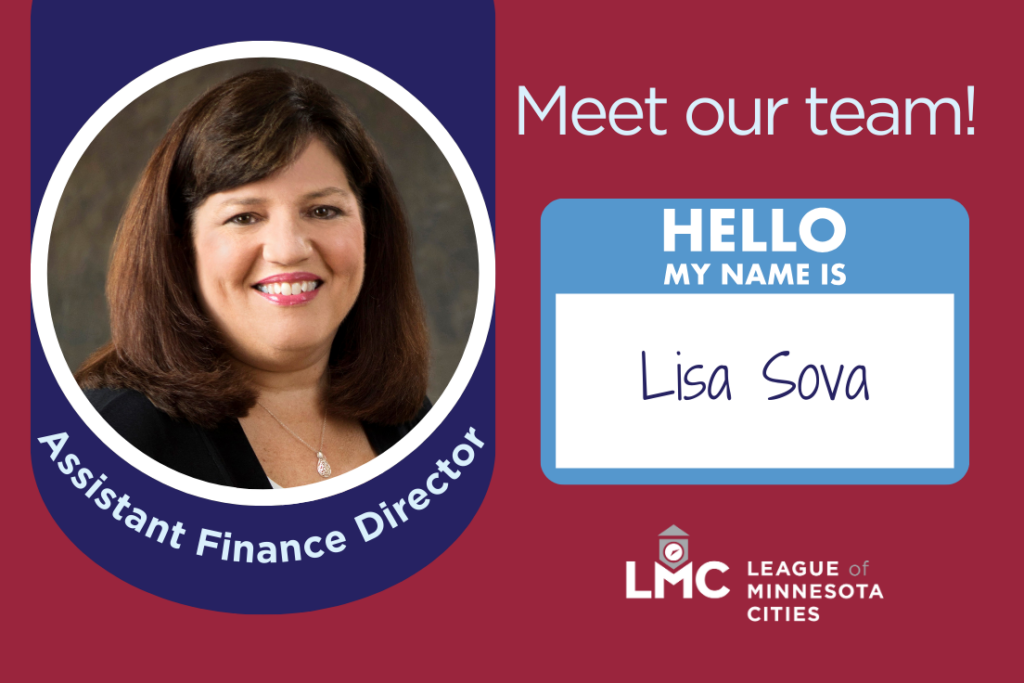Meet Our Team: Q&A with Assistant Finance Director Lisa Sova

If you work in local government finance in Minnesota, there’s a good chance Lisa Sova has assisted you with your city’s financial questions.
In our Q&A, Sova, the League’s assistant finance director, shares how she was once a new city employee learning the ropes of government finance. Now, she’s happy to share resources and guidance for clerks, treasurers, and finance staff around the state.
How would you describe to members the work your team does?
The Assistant Finance Director-Member Services position is unique. I’m a member of the Finance Department, and I’m humbled to work side-by-side with such exceptionally professional and knowledgeable people in the Finance Department. The work that I do is a little bit different than what other members of the Finance Department do. Most finance staff members focus on internal accounting, so they’re managing the League’s budget, the League’s payroll, paying the bills for the League, managing the memberships and the dues, and all of the transactions that accompany the many special events the League provides. They coordinate the annual audits and manage software upgrades for the League. They also provide financial statements in a timely manner to board members and directors.
My role is member-focused. I provide education and training for members on governmental accounting and related topics such as budgets, investments, borrowing, and various state and federal reporting requirements. I work closely with the Research Department and Human Resources Department because our tasks are very much the same; we are all focused on assisting members.
What schooling or work experience did you have before this job?
Before joining the League, I was a city administrator. My job duties included the roles of city clerk and treasurer—my first exposure to governmental accounting. I have a bachelor’s degree in accounting and an MBA. When you are studying accounting, governmental accounting receives a light touch, so I learned a lot doing the work. Like many others who land in a city, I filled a position that had been vacant for several months. There wasn’t anyone on site to provide training, so I found my way.
I was fortunate to cross paths with several very smart people who were generous with their time. I got to know a lot of people at the League just because I had so many questions and the League was such a great resource. The League of Minnesota Cities Insurance Trust was another helpful resource that I relied on for guidance. The site visits from loss control consultants and the regional safety groups were incredibly helpful and I never missed a Safety and Loss Control workshop. I was honored to be appointed to the League of Minnesota Cities Insurance Trust Board of Trustees. Prior to my work in local government, I worked in corporate accounting as a financial analyst. I also spent some time working in human resources.
What do you enjoy about working in the public sector and working with cities?
What I like best about working with cities is being able to help cities do the best that they can with the resources available to them. Every city is different, and population can be deceptive when it comes to services provided. There are small cities that offer an abundance of services because they are remote, and they don’t have neighboring cities to share services.
What are your top priorities in the summer months, and what will you be working on heading into fall?
Summer is when budget planning starts for the following year. Following the legislative session, state funding levels are calculated and things like Local Government Aid and Transportation Advancement Account State Aid are available so cities can better estimate revenue. City councils set goals. Staff starts planning how the goals will be implemented, and the funding needs that relate to the goals are incorporated into the budget. The League publishes a Budget Guide that is very helpful as cities work through the process. As we head into fall the preliminary budget and preliminary levy are adopted with a September 30 deadline.
Fall is a good time to secure the services of an auditor for those cities that will be required to have an audit of their 2024 financials. There is a shortage of auditors, and this makes it challenging for cities to obtain this necessary service so planning ahead is key.
What is one thing you wish more members knew about the work you do?
Cities are limited on how excess cash, or fund balance, can be invested. Accordingly, city officials have an obligation to be good stewards of public funds and that includes maximizing the return on investments. Investing city funds is heavily regulated by state statute and can be intimidating. To assist cities with navigating investments, the League of Minnesota Cities sponsors and governs a cash management and investment program called the 4M Fund. The fund is monitored by the 4M Advisory Committee which is made up of city finance officials who provide oversight and ensure the funds are managed and invested in the best interest of fund participants. Mark Ruff, the Finance Director for the League, and I are the staff members to the 4M Advisory Committee. The 4M Fund provides safety, daily liquidity, and highly competitive yields.
Why do you do what you do? What do you enjoy about your job?
When I was a city administrator, I struggled to find resources. The position that I have right now didn’t exist at the League. I’m so grateful that the League recognized the need for specialized resources in government finance. I’m delighted to be able to provide that resource to cities. It’s my goal to provide tools and training to assist city staff and elected officials as they learn about government finance. To me, that’s really rewarding.

